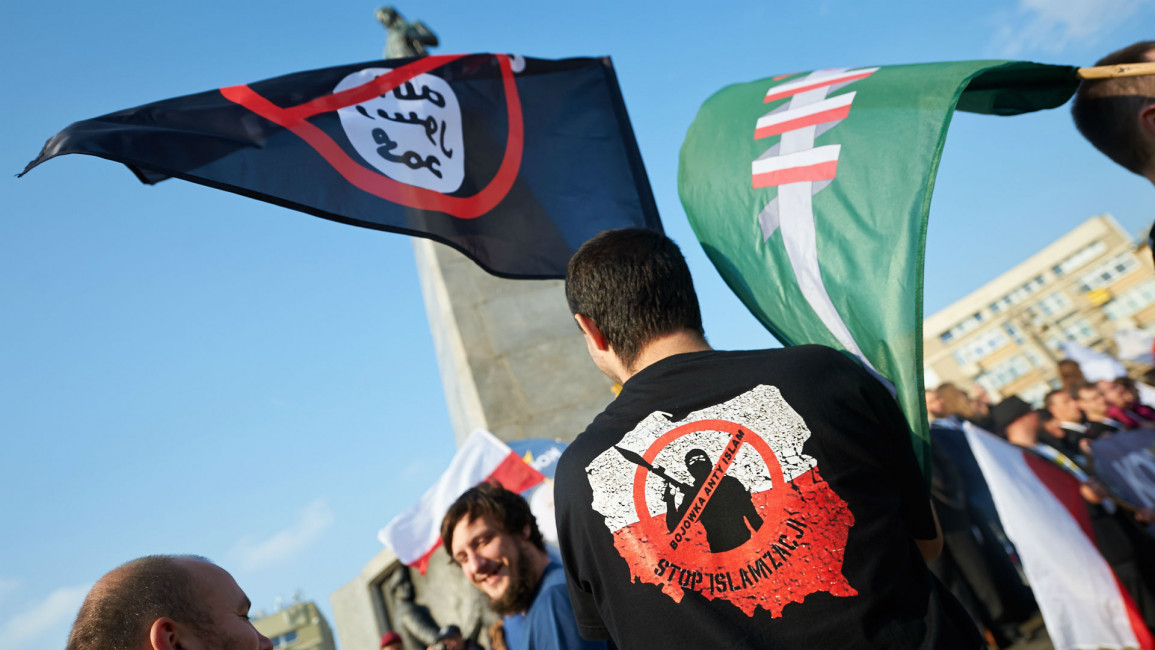
How Assad shaped our view of Syria's displaced
This week, we have seen Europe in full dichotemy.
Germany made some of the most progressive steps to help those affected by a humanitarian catastrophe in Syria by offering refuge to 800,000 refugees.
Then it appeared to get cold feet.
On Monday, Berlin did the unimaginable and reinstated border controls with neighbour Austria, seeming a nail in the coffin for its dream of a "borderless Europe".
A new iron curtain is being drawn across the continent, and the barbed wire fence dragged across Hungary's border with Serbia is aimed at keeping outsiders - Syrians, Iraqis and Afghans in this case - out of the European project.
On the weekend, hundreds of thousands in the UK and Denmark took to the streets to pressure their governments to allow in more refugees.
On Tuesday in Poland, refugee campaigners demonstrated in one part of Warsaw, while many more gathered to oppose EU plans of enforcing a quota system for refugees on the EU newcomer.
Syrians - who make up the majority of refugees in Europe - have been torn apart by left and right blocs in Europe.
While four years of conflict in Syria has killed more than 250,000 people, passive liberals and progressives have helped the war endure by closing their eyes and doing nothing.
It is the far-left and far-right that have been more vocal and helped shape our understanding of the conflict in recent weeks.
Last week, the general consensus in the media was that the Syrian refugees landing on Europe's shores were a helpless but faceless huddle, after emotional images underlined the danger and struggles they have endured.
Now the right-wing media is making us view them - or some of them - as direct participants in the conflict, after fears of "embedded" Islamic State group fighters among the refugees gripped the tabloid press.
|
— Elmo Lewis (@theElmoLewis) September 15, 2015" style="color:#fff;" class="twitter-post-link" target="_blank">Twitter Post
|
Both the far-right and elements of the far-left have adopted similar positions regarding the war in Syria.
Bashar al-Assad's regime has been portrayed as victim of a US-led conspiracy, or a martyr to a Rothschild plan hatched to destroy the so-called anti-capitalist, anti-imperialist nation.
There is no doubt that Syria has been a victim of international power politics.
The United Nations has been impotent throughout the conflict due to the split in the Security Council - between Russia and China on one side, and the US, UK and France on the other - and only issued toothless statements for both parties to end the conflict.
Its envoys have witnessed or heard the bombs killing masses of civilians - such as the gas attack on Ghouta - when they visited the Syrian capital on peace missions.
The Syrian regime has been attempting to appeal for international sympathy.
From day one it has claimed to have been part of a progressive and heroic life-and-death battle against extremism and terrorism - an international plot to destroy the religious and ethnic mix of Syria.
Twitter Post
|
Turmoil in Iraq and Lebanon have been used as examples by the regime of what happens if international parties meddle in Syrian politics and dictators aren't allowed to govern the Middle East.
Assad has also portrayed himself as the only leader capable of uniting the country, and stop it from descending into further bloody chaos.
With regards to Syria's policies of confronting Israel and the US, it had traditionally been successful in gaining the support of several far-left groups. The fact is that this goes no further than rhetoric and support for the regime's long-time ally in Lebanon, Hizballah.
The far-right, which despises Israel for being a Jewish state - rather than an aggressive occupying force - have also backed Assad in the conflict.
Nick Griffin, leader of the far-right British National Party, has made several visits to Syria during the conflict to support the Syrian regime.
To the backdrop of the Syrian refugee crisis, the famously anti-immigration former MEP said on Twitter on Saturday that he would be interviewed by a "patriotic/Christian" web TV channel in Poland.
"We're lucky to have so many in the UK," he continued.
When users pointed out that Griffin has long-opposed East European immigration, he made an alarming comment.
|
— Nick Griffin (@NickGriffinBU) September 5, 2015" style="color:#fff;" class="twitter-post-link" target="_blank">Twitter Post
|
Griffin appears to imply that these Syrian refugees fleeing Assad's barrel bombs and cut-throat IS militants will eventually become the enemies of "white Europe" - and civil war is inevitable.
The Netherlands' far-right politician Geert Wilders has also described Syrian refugees as an "Islamic invasion".
UKIP's Nigel Farage stoked fears about an IS infiltration into Europe.
|
— Nigel Farage (@Nigel_Farage) September 11, 2015" style="color:#fff;" class="twitter-post-link" target="_blank">Twitter Post
|
This fits with statements that Bashar al-Assad has made about the rebels and opposition ranks being made up of terrorists and foreigners.
Trying to deflect responsibility for the refugee crisis, the regime and its allies have hinted that the thousands of refugees now in Europe might harbour extremists, and blamed the flight on "terrorist" activities in opposition-held areas.
Right-wing media in the West - looking for an anti-immigration angle to the refugee story among a flood of heart-breaking images - have cottoned on to this idea that the seemingly helpless and innocent crowds could be infiltrated by extremists.
They were assisted by a recent remark by Lebanese education minister Elias Bou Saab - who said he believed one in fifty Syrian refugees were IS fighters, during Prime Minister David Cameron's visit to Lebanon.
|
— UK in Lebanon (@ukinlebanon) September 14, 2015" style="color:#fff;" class="twitter-post-link" target="_blank">Twitter Post
|
This has not been helped by comments made by IS that they have done exactly this - but hyperbolic statements of this kind are not uncommon by extremist groups.
Sadly, the man largely responsible for making these people refugees - Bashar al-Assad - has helped manipulate fears about Arab-Muslim "terrorism".
This has contributed to our views towards Syrians fleeing war, and it is the populist right-wing bloc in Europe and Syrian regime which has benefited from European paranoia.




